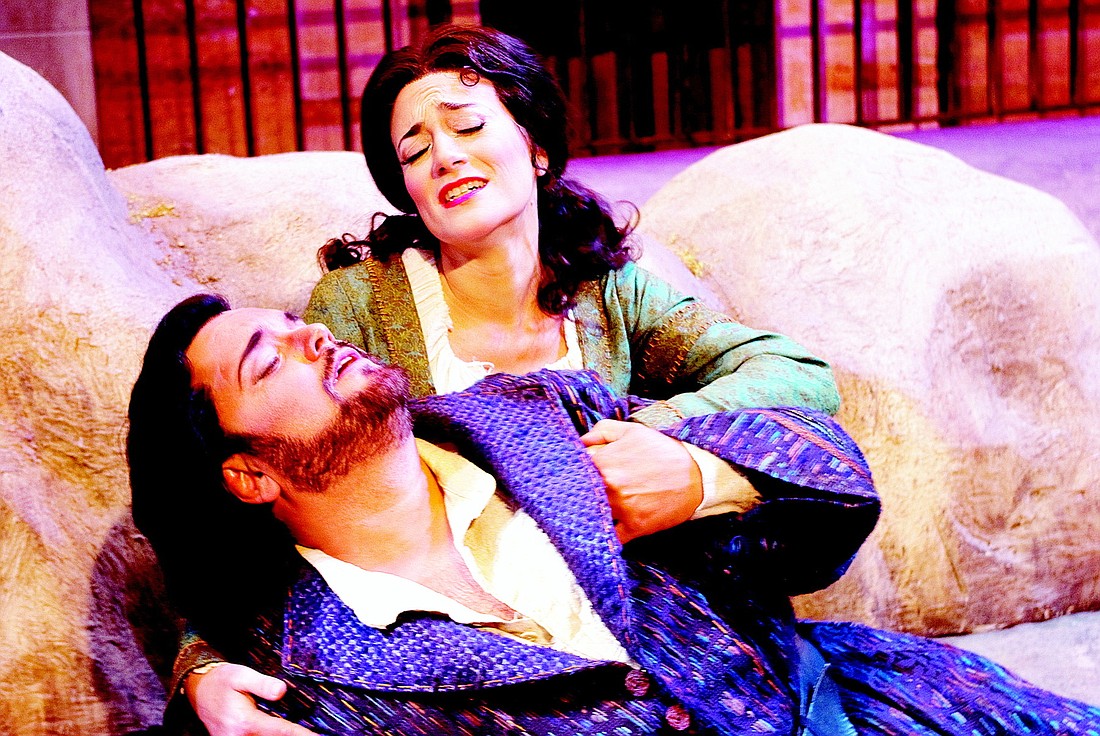- November 28, 2024
-
-
Loading

Loading

If big exciting music with great singing is your thing, “I Lombardi” is your ticket to opera heaven. Only Verdi’s fourth opera (it comes between “Nabucco” and “Ernani” in the composer’s hit parade), it’s a drama filled with religious concepts, processions, prayers and a crusade. But, proving the old French saying, “Plus ça change, plus c’est la même chose,” — the more things change, the more they stay the same — “I Lombardi” is filled with Christian-Muslim animosity and the righteousness of both religions to prove themselves the only road to heaven and forgiveness. Of course, in the end, Christians win, and the hero, who dies but sings another aria, is transported to more heavenly climes where he gives peace and serenity to those left behind.
“Lombardi” is the kind of work that needs no translation and little staging. Scenic diversions that allow us to know where the singers happen to be at the time are conveniences more than necessities, but, in the excellent hands of Jeffrey W. Dean, the sets that take us from church squares and interior palaces to caves, gritty desert tents and spectacular views of Jerusalem — almost all of which are transformed before our very eyes by members of the cast — give us the proper context without interfering with the most important element of this opera, the music.
Ken Yunker is nothing short of brilliant in his lighting designs, especially in the Holy Sepulchre scene in which Oronte returns behind a diaphanous scrim that seems lit by Michelangelo himself. Martha Collins’ staging can’t be faulted because there is probably no other way to present this full-frontal, stand-and-deliver opera, unless we get into Regietheater and Peter Sellars productions.
You’ve noticed that we’ve been skirting the plot. Good reason: There really isn’t any. None you can follow, anyway. This is opera for the sake of singing and, as such, it’s purely magnificent, with the soloists pouring out unadulterated music, the chorus shining in its splendor and not much thought to anything else.
Arvino and Pagano are the sons of Lord Ro. They don’t get along. Viclinda and Giselda are, respectively, the wife and daughter of Arvino. Pirro is Arvino’s squire (later to become a turncoat). Pagano kills his father because he doesn’t recognize him. Pagano becomes a hermit whom no one recognizes. Giselda falls in love with Oronte, the son of Acciano, tyrant of Antioch and (woo, woo!) a Muslim. Soffia is the mother of Oronte and the wife of Acciano and … a secret Christian!
Now you know why there are a lot of dumbfounded people sitting around you. They think they’re supposed to know all this and they’re pretending they do.
The danger in that is they might be missing the important things: the music and the performances.
Kevin Short’s robust, edgy baritone cuts over the orchestra like a great metal trumpet that gives his Pagano-turned-hermit a sense of harsh acidity that lets us believe his far-fetched character. Mathew Edwardsen as his brother, Arvino, is a rich, warm tenor, and Benjamin Gelfand, as Pirro, is an excellent bass.
Rafael Davila, who takes on the heroic role of Oronte, gets vocally better and better. His ringing tenor has a brilliant top that resounds through the house, and he’s well on the road to pulling all the pieces of that big voice together into what should become a major talent.
Lindsay Ohse, a studio artist, stood out for her compassionate and reverberating Viclinda, and Abla Lynn Hamza’s large, beautiful, but cutting soprano soared well over the massive on-stage forces while staying in the character of Giselda.
Sarah Larsen and Heath Huberg, also studio artists, did well in the smaller roles of Sofia and the Prior of Milan.
Although the men seemed a bit ragged at times, the real stars of this opera were the forceful chorus, which has almost as much importance as the chorus in “Nabucco,” and the impressive orchestra led by the ardent Verdi proponent, Victor DeRenzi. The bewitching flute obbligato in the “Ave Maria” and the dazzling violin solo toward the end of the opera almost stole the show and were both enough to raise neck hairs and, in the case of concertmaster Liang-Ping How, bring the opera to a halt while the audience (and fellow orchestra members) cheered.
“I Lombardi” may be hard to follow but, for sheer music and vocalism, it’s a triumph.